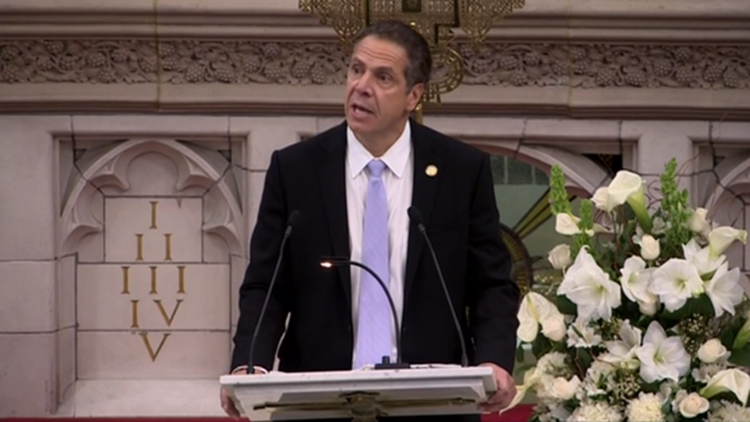ALBANY – Gov. Andrew Cuomo is hitting the road Monday to give six speeches in three days across New York, foregoing the annual State of the State address that historically is given each year at the Capitol.
The tour, which includes stops Monday in Buffalo and Tuesday in Westchester County, will continue what has been daily announcements in recent days from Cuomo to lay out his priorities for 2017.
Lawmakers are viewing the regional speeches as a slight to them and eschewing the tradition of the governor going before the Legislature to address the condition of the state.
“We are the group that is directly responsible for reviewing and voting on legislation and moving bills through the process, so to ignore us as a whole would be grossly irresponsible,” said Assemblyman Stephen Hawley, R-Batavia, in a statement.
The addresses will also take place when the Legislature is in session in Albany, making it unlikely that many of them will leave the Capitol to go to the regional speeches.
“The speaker laid out a comprehensive agenda this week on issues like education, reproductive rights and criminal justice reform, so we have a lot of work to do here in Albany and that is what we will be focusing on,” said Michael Whyland, spokesman for Assembly Speaker Carl Heastie, D-Bronx.
Here’s some issues to look for as Cuomo tours the state:
Who will be there?
It probably won’t be lawmakers, who are scheduled to be in session on Monday and Tuesday.
Only Jeff Klein, the head of the Independent Democratic Conference, hasn’t indicated whether he will attend one of the speeches. The other legislative leaders all said they won’t be attending.
Cuomo offered a limit about of tickets to the public, and local officials will likely be there.
“Senator (John) Flanagan was invited to attend, but declined,” Senate GOP spokesman Scott Reif said. “He will be in Albany, in session, fulfilling his duties as Senate majority leader."
The Legislature is fighting with Cuomo over a failed deal last month that would have included lawmakers first raise since 1999.
On their first day at the Capitol last Wednesday, lawmakers openly talked about pushing back against the Democratic governor this year, saying they need to be treated as a co-equal branch of government.
“At the end of the day, let’s not get hung up on the past,” Sen. Fred Akshar, R-Colesville, Broome County, said. “Let’s continue to move forward and have that relationship of mutual respect.”
Cuomo’s office brushed off lawmakers not attending.
"By definition, these regional addressees are designed to communicate directly with the citizens of New York, not legislators,” Cuomo spokesman Rich Azzopardi said in a statement.
“In fact, the Legislature is in session, so it would be virtually impossible to attend.”
What will be proposed?
So far, Cuomo has outlined several of his initiatives for 2017.
Governors use January to detail their plans – then they push for those issues as part of the state budget for the fiscal year that starts April 1 or before the six-month session ends in mid-June.
Last year, for example, Cuomo sought a $15 minimum wage and paid-family leave that dominated the session. Both were approved March 31.
This year, Cuomo’s top announcements so far included free tuition at public colleges for applicants whose household incomes are less than $125,000 a year.
He also proposed a child-care tax credit boost and a plan to improve the state’s cyber security.
Cuomo is also working on a deal that would close the controversial Indian Point power plant in Westchester by 2021, but he hasn’t officially announced the agreement.
Cuomo’s speech on Tuesday in Westchester will be at SUNY Purchase.
Another speech on Tuesday in the afternoon will be on Long Island, with speeches on Wednesday in Albany and Syracuse.
“Our goal has always been to bring the issues to the people, to develop the public support, and then have it communicated to the elected representatives,” Azzopardi said.
Cuomo never held his State of the State address in the Assembly chambers, as governors had done for nearly a century.
He held them as PowerPoint presentations at a convention center in the nearby Empire State Plaza.
“From Day 1, by moving the address from the legislative chamber to the convention center with 3,000 seats, it has always been about bringing government to the people,” Azzopardi said.
How will be pay for it all?
The financial details of his proposals remain unknown, but will gain more clarity on Jan. 17 when Cuomo releases his budget proposal for the coming fiscal year.
Lawmakers are already questioning the tuition plan, saying Cuomo’s estimate of a $163 million a year cost to the state appears low.
“How can we ask hardworking people who are still paying off their own high-interest educational loans to fund a new, expensive entitlement program?” Assemblyman Gary Finch, R-Springport, Cayuga County, said in a statement.
Cuomo’s office said the program will supplement existing tuition-assistance programs in New York, which already cost the state $1 billion a year.
“The way this society said, ‘We’re going to pay for high school because you need high school,’ this society should say, ‘We’re going to pay for college because you need college to be successful,” Cuomo vowed during a speech Tuesday to announce the proposal.
Also, the governor’s ideas come during a tight fiscal time for the state.
The state faces a nearly $1 billion budget gap for the upcoming fiscal year, its first significant hole in several years.
So lawmakers are warning the state needs to be careful in making too many spending promises, vowing to scrutinize the governor’s proposals.
“When we get up and start asking tough questions, some people freak out,” Flanagan said Wednesday, without naming names.
“We have an obligation to ask hard questions.”



